- Home
- Lauren Willig
The Summer Country Page 4
The Summer Country Read online
Page 4
“It is very bright, isn’t it?” said Laura faintly. Her parasol was white lace, designed for the fugitive sunlight of Bristol summers. The starched fringes were already looking a bit wilted about the edges.
Emily furled her own sturdy green parasol and held it out, handle first. “Here. Take mine. It’s larger.”
“But what about you?”
“I have my bonnet,” said Emily. One of Cousin Lily’s, made over, the brim unfashionably deep. But like the outmoded pagoda sleeves on her dress, it was perfect for the weather. “You know I don’t mind if I’m burnt brown.”
“At least you don’t freckle,” put in Adam, who did. His hat was tipped down over his eyes. “Gran used to make me put lemon juice on my nose in summer. Much good it did me.”
Dr. Braithwaite nodded toward a passing carriage. “Some women wear masks made of white gauze. The sight can be discomfiting for visitors. It makes them look like ghosts.”
“Ah, ghosts.” Adam sat up straighter in his seat. “You did promise us a ghost story, Dr. Braithwaite. Or must we wait until we stand at twilight by the ruins?” Turning to his wife, he said, “What was that poem you made me read? Something about waning moons and demon lovers.” He pulled a face as he said it.
“Don’t be such a Philistine,” Emily scolded. She had always admired Laura’s love for the written word, even if she didn’t share it.
“Don’t tell me you read it,” retorted Adam.
“Well, no. But then, I never pretended to be poetical,” said Emily apologetically. She turned to Dr. Braithwaite. “And as for ghosts . . . As a man of science, I shouldn’t have thought you would give credence to ghost stories.”
Dr. Braithwaite settled back against the squabs, provokingly aloof. “There are more things in heaven and earth, they say.”
“Hamlet said, you mean,” retorted Emily. “I hardly think he was a reliable source.”
She surprised him into a grin. It made him look years younger, closer to her own age than she’d first imagined. “He did see ghosts.”
“Wasn’t he mad?”
“Only north by northwest.” As if regretting his descent into whimsy, Dr. Braithwaite said, “I haven’t heard of any demon lovers at Peverills, but there are caverns. Some of them are quite deep. You won’t want to go wandering about on your own. It’s not just the caves. There are snakes, manchineel trees . . .”
“You make it sound like the Garden after the fall.” Emily rather suspected Dr. Braithwaite of deliberately warning her off, retaliation for having to waste an afternoon of his time.
“If you eat any apples here, you’ll be meeting your maker sooner than you intend,” warned Dr. Braithwaite. “The Spanish call the fruit of the manchineel tree the apple of death.”
“There’s your Scripture for you, coz,” said Adam lazily. “Like the apple in the Garden, which brought death to the world.”
Dr. Braithwaite was not amused. “Only not quite so immediately. Or so painfully. Do not put anything in your mouth that wasn’t first packed in that basket.”
“I had thought the island was almost entirely under cultivation.”
“It is,” said Dr. Braithwaite bluntly. “That doesn’t mean it isn’t dangerous. This isn’t Bristol, Miss Dawson.”
Did he think Bristol was without dangers? Emily bit her tongue, settling back against the luxurious velvet squabs of the coach. He was right, though. She might know how to stitch an arm slashed by a knife, but she didn’t know the first thing about snakebite.
The urban landscape of Bridgetown, so foreign in some ways, so familiar in others, was long behind them. The pastel houses by the side of the road had given way to an unbroken landscape of green fronds. The shoots swayed and whispered in the wind. It wasn’t just the sound but the smell that surrounded them; Emily could feel it clinging to her skin, like the residue of a sweet. It tickled against the back of her throat.
The foliage surrounded them, the road the only sign of human habitation. Emily thought she could hear voices, just, and the thwack of something heavy, but the rustling of the leaves in the wind filled her ears, distorting all other sounds. She knew that one could cross the whole island in less time than it took to get from her aunt’s house in Bristol to their summer lodging in Weston-super-Mare, but the mathematics of the distance fell away against the impression of vastness, of endless cane, endless sky.
They were less than an hour from Bridgetown, but they might have been the only people in the world, Noah and his family in the ark, bobbing about with no set destination.
“It does go on and on, doesn’t it?” said Emily, knowing she sounded ridiculous, but not sure how to put her feelings into words. She had grown up in a tiny house surrounded by tottering structures crammed with humanity, people pressing about on all sides. She wasn’t quite sure how she felt about all this emptiness.
“This?” Adam wrinkled his nose at her. “This is no great distance. The last time I went to London . . .”
She didn’t need to hear, again, about Adam’s trip to London, which, apparently, had turned him into a cosmopolitan man of the world with one visit to Bond Street. Or at least to hear Adam tell it. “I meant the cane. There’s just—so much of it.”
Adam looked at her under the brim of his hat. “That is the point of a plantation, coz. Acres and acres of pure profit.”
Yes, but how did people live in the midst of this? Emily couldn’t say it, didn’t want to admit to Adam that she might have any doubts about the course she had set. She would become accustomed to it, she was sure, just as her grandfather had become accustomed to Bristol.
“Just think, Emily,” said Laura, making an effort to rouse herself. Beneath the flush of heat, she looked rather green from the motion of the carriage. “This might be your sugar.”
“It’s not,” said Dr. Braithwaite. In the silence, Emily could hear a pattern of thwack and rustle, the far-off sounds of workers’ voices, clearer now. “This is Beckles land. Your closest neighbors. They’re the largest landowners in these parts—next to Peverills.”
“Is Peverills that large, then?” asked Adam, looking significantly at Emily. “I can just see you, skirts kilted up, scythe in hand. . . .”
“You’ll see nothing of the kind.” The mockery was a bit rich coming from a man who had never ventured farther into the countryside than a picnic on the outskirts of town. She knew quite as much of agriculture as he, which, between the two of them, amounted to absolutely nothing. Emily turned to the doctor. “Does one use a scythe on cane?”
“No,” said Dr. Braithwaite. “The usual implement is a cutlass—a form of machete. I wouldn’t advise attempting it. Not unless you want to lose a leg.”
“You know a great deal about it,” said Adam, and Emily knew he was wondering, as she was, if Dr. Braithwaite knew it from experience, if he, like his uncle, had once been a slave.
“I’ve stitched up more gashes than I care to count. You can tell an experienced cane cutter by his scars,” said Dr. Braithwaite shortly. “You wanted to know when we reached your land? Here it is.”
“This?” Emily clutched at the seat as the barouche lurched over a rut in the road.
Cane stalks long dead lay brown and withered, surrounded by grasses high as Emily’s shoulder, beige and brown in the heat. Vines climbed over the frame of an abandoned shack, like green fingers dragging the structure back down into the earth. An old wagon lay in pieces, one wheel fallen and cracked. The carriage lurched as they took a right-hand turn onto a narrower road, pitted and overgrown.
“This,” said Dr. Braithwaite.
“Mr. Turner did say it was neglected,” said Emily, trying not to show the jolt of disappointment she felt deep down in the pit of her stomach.
After all, what did she know of cane? Maybe this was what it looked like every season, before being cleared for harvesting. Wasn’t being left fallow supposed to make the land more fertile?
“We might be the first people,” she said with an attempt at cheerfulness
. “I imagine this must be what the island looked like two hundred years ago, when colonists were first settling here.”
“Except for the structures,” said Dr. Braithwaite drily. He pointed to a stone cone that looked like something out of old Holland, but for the vines that twined it around and around. A snake slithered through the gash that had once been a door. “That’s the Old Mill. The overseer’s house is down that road. The bookkeeper’s house is to the left.”
“The stones seem sound,” said Emily.
“It was built to withstand hurricane and riot.”
The carriage lurched past a pair of stone gateposts thickly twined with dark green vines. An alley of broad-leaved trees spread out before them, and, at the end of it, loomed the house.
Chimney pots stabbed into the sky above high, arched gables. The casement windows had been made to stare out at the Sussex downs, not a Barbados cane field. It was a Jacobean manor house transplanted, all intricate brickwork and ornate finials. Only the wide, shaded portico set into the front of the house made any concession to the climate.
The leaves of the trees and the sun played tricks with Emily’s eyes, making her think—no. It wasn’t a trick. The walls stood jagged, blackened, empty windows opening onto nothingness. A pillar lurched crazily to the side, its mate toppled sideways in the long grass.
“I—” Emily found herself without words. It was majestic and horrible, a testament to the fleeting nature of man’s vanities, and she knew she ought to be finding it all terribly interesting and improving, but all she could do was bite her lip and try not to let her distress show.
“This is as close as we can get,” said Dr. Braithwaite brusquely, and Emily wasn’t sure whether to be grateful to him for taking pity or annoyed with herself for needing it. “The central block is still standing. Although I wouldn’t vouch for the roof.”
Laura’s hand slid into Emily’s and squeezed. “It’s very picturesque.”
Picturesque wouldn’t keep the rain off. “I suppose Grandfather must have bought it for the land,” she said, trying to keep her voice level.
“He probably got it cheap,” said Adam. “You know how he likes—liked—a bargain.”
They all sat in the barouche, like castaways marooned in a rowboat, staring out at the ruin that was now Emily’s.
“It must have been lovely once,” said Laura. “Perhaps he remembered it as it was.”
Lovely wasn’t quite the word Emily would have used. Impressive. Grand. Ruined. “Is this recent?” she asked Dr. Braithwaite.
“It’s been this way for as long as I can remember. When I was young, boys would dare each other to come up here after dark. Brave the duppies. Ghosts,” Dr. Braithwaite translated. Bringing himself back to the present, he said briskly, “There was more than one ankle broken that way. Still is, I gather. I set one last week.”
“There you are, Em,” said Adam. “Shall we? There’s the governor’s reception tonight.”
She wasn’t ready to retreat to Bridgetown yet. “We’ve only just got here. And there’s hours yet before we need to get dressed.” She looked uncertainly at Dr. Braithwaite. “Could I . . . see it? Since we’ve come all this way?”
“There are snakes.”
“I’m wearing boots. Stout ones.” Looking down at Laura’s dainty footwear, she said, “You’d best get started on the picnic. I won’t be long.”
Adam looked from Emily to Dr. Braithwaite. “I’ll come with you.”
And leave Laura alone? Laura, flushed with heat, was clearly in no condition to go adventuring. “No need,” said Emily firmly. “We won’t go far.”
Adam looked like he might argue, then shrugged and leaned back. “As you will, coz. We’ll be here, eating all the cakes.”
“Don’t blame me if you turn an ankle,” said Dr. Braithwaite resignedly. Swinging down, he held out a hand to her. “Miss Dawson?”
“If I do,” she said, “at least I have someone to set it.”
She hopped down and landed heavily on what must have once been a fine sweep of gravel, but now was rutted from rains and neglect. The doctor hadn’t, she realized, been joking about the danger to her joints. The ground ahead of them was full of bits of masonry and unexpected holes.
On the ground, rather than in the carriage, the full bulk of the house made itself felt, the blackened gables pushing high into the sky, the wings stretching on and on in either direction. It made Emily feel very small and insignificant; her grandfather’s great house on Queen Street had been on a more human scale.
Emily craned her head, taking an involuntary step back. “It’s rather large, isn’t it? It dwarfs one, rather.”
“It’s meant to.” Dr. Braithwaite steadied her with a hand on her elbow. “Careful now.”
A flight of stairs led to an arched portico, missing pillars making it look like a jack-o’-lantern’s grin. “Is that the entrance?”
“Yes, but I wouldn’t advise entering.”
Emily looked quizzically up at him. He was taller than she’d realized; she felt quite small beside him in her sensible, flat-heeled boots. “I thought you said the central block was still standing.”
“Standing, yes,” said Dr. Braithwaite. “But that doesn’t mean it’s sound. The floor is rotted out in parts; the stairs are treacherous. If you must go adventuring, I’ll take you around the side.”
“It’s hardly idle curiosity. It is my house after all.” Perhaps if one cleared away the debris . . . it might not be so bad as it looked.
“If you’re looking for buried treasure, you’ll be disappointed.” Dr. Braithwaite led her sideways, not up the stairs but past them, down the length of the house. The ground-floor windows were all but obscured by a prickly hedge bristling with green fruit. “Anything of value is long gone.”
They turned the corner, and the full scope of the destruction was laid bare. Large chunks of masonry had fallen at crazy angles, blackened beams resting on hollow foundations. Bits of intimate debris lay among the rubbish: a charred, cracked chamber pot. A child’s doll, the limbs scorched, the face blackened.
Emily found herself leaning down toward the doll. “Snake,” said Dr. Braithwaite tersely, and she jerked back.
“What happened here?” she asked.
Dr. Braithwaite navigated expertly around a blackened pile of rubble. “Fire.”
“Well, yes, I gathered that.” Perhaps it was the solidity of the central block that made the devastation so jarring. Walls still stood at various points, waist high, shoulder high, creating a crazy maze where once there must have been chambers and corridors. One staircase spiraled to nothingness. Another opened onto a fragment of what once might have been a gallery of sorts.
They paced the perimeter in silence, until Dr. Braithwaite said, “There was a rising here forty years ago. I don’t imagine you’ve heard of it.”
“I haven’t. But I can imagine why.” Emily stopped, looking up at him. “I belong to the Bristol and Clifton Ladies’ Anti-Slavery Society. My father is a founding member of the British and Foreign Anti-Slavery Society. I heard Mr. Frederick Douglass speak when I was a girl.”
Dr. Braithwaite raised a brow. “Then there’s nothing I need tell you. I am sure you can imagine the whole of it.” Before Emily could defend herself, he went on. “The revolt occurred for the usual reasons. It began in St. Philip and spread to Christ Church. Peverills was one of the plantations torched.”
“Was the owner so cruel, then?” Even as she said it, she realized her own mistake, and quickly added, “Not that a man would need to be abused to break his chains. The very institution of slavery . . .”
“You can spare me the sermon, Miss Dawson. My uncle owned slaves when I was a boy.”
“But—” Emily bit her tongue before she could commit another faux pas. But it was too late. A sardonic smile spread across Dr. Braithwaite’s face.
“Like many of the worthy merchants of Bridgetown, my uncle was a proponent of emancipation only for his own relations, not for tho
se who worked for him. Many of them signed a petition to the council, urging against emancipation—not that you’ll find many who will admit to that now.”
“But to enslave one’s own people . . .”
“Is it more horrific than enslaving someone else’s? Should my uncle be subject to sterner censure than the man who owned this estate? Or, for that matter, than those who traded in sugar, knowing whence it came?”
Dr. Braithwaite’s curt tone left Emily floundering for an argument. Useless to tell him that their household had gone without sugar for a fortnight as part of her father’s symbolic rejection of the slave system. It sounded as paltry as it was. Particularly when there was no denying that her grandfather’s wealth, the wealth that had paid for her schooling, for the clothes on her back, for the plantation lying in blackened ruins in front of her, had been built on sugar. He hadn’t grown it, but he had traded in it and made a fortune doing so.
Looking away, over the ruins of the plantation, she said, in a constrained voice, “It is strange the people who lived here didn’t rebuild.”
“Is it so strange?” Dr. Braithwaite didn’t press the topic. Presumably, thought Emily, digging her toes into the rubble, because he knew that he had won. “Sugar planters were in a bad way forty years ago. They had better things to do than shore up houses that never made sense here anyway.”
“Yes, but it seems strange not to have cleared away the rubble and done something with the bit that still stood. It seems a waste. And what of the fields? Why just leave it all? And don’t,” she added vehemently, “tell me it’s all the fault of ghosts!”
Dr. Braithwaite was spared responding by a shout, underscored by the sound of hoofbeats.
“Ho, there!”
A man spurred his horse forward through what once must have been gardens, waving his hat in their general direction. The sun struck gold and bronze off his hair. He swung off his horse, striding forward toward them. His face was flushed with exertion and emotion.

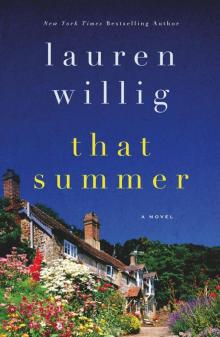 That Summer
That Summer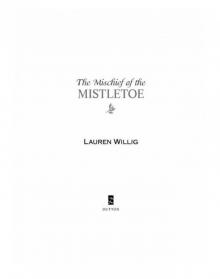 The Mischief of the Mistletoe
The Mischief of the Mistletoe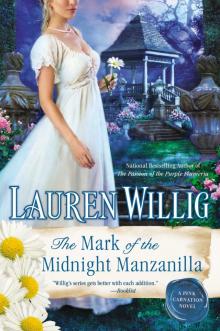 The Mark of the Midnight Manzanilla
The Mark of the Midnight Manzanilla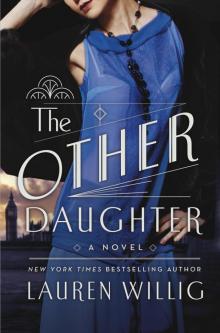 The Other Daughter
The Other Daughter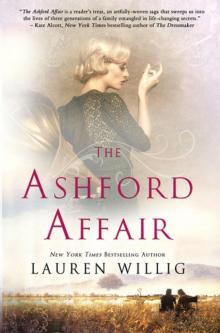 The Ashford Affair
The Ashford Affair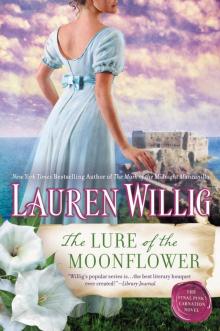 The Lure of the Moonflower
The Lure of the Moonflower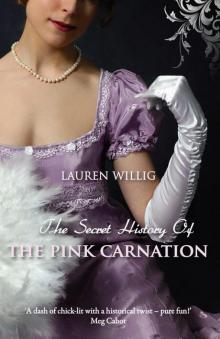 The Secret History of the Pink Carnation
The Secret History of the Pink Carnation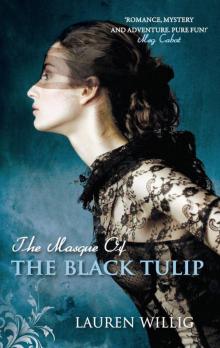 The Masque of the Black Tulip
The Masque of the Black Tulip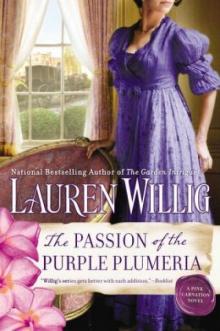 The Passion of the Purple Plumeria
The Passion of the Purple Plumeria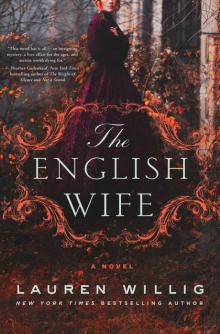 The English Wife
The English Wife The Garden Intrigue
The Garden Intrigue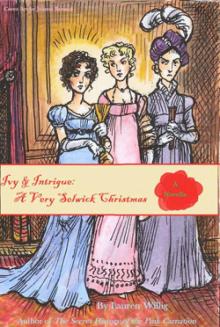 Ivy and Intrigue: A Very Selwick Christmas
Ivy and Intrigue: A Very Selwick Christmas The Orchid Affair
The Orchid Affair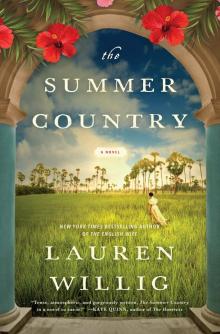 The Summer Country
The Summer Country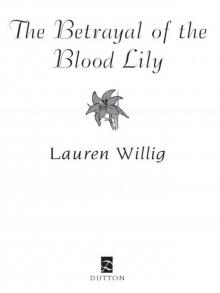 The Betrayal of the Blood Lily
The Betrayal of the Blood Lily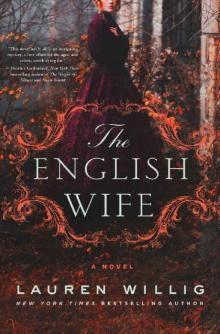 The English Wife: A Novel
The English Wife: A Novel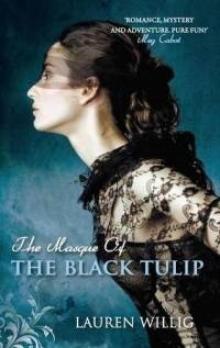 Masque of the Black Tulip pc-2
Masque of the Black Tulip pc-2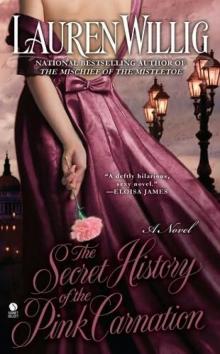 The Secret History of the Pink Carnation pc-1
The Secret History of the Pink Carnation pc-1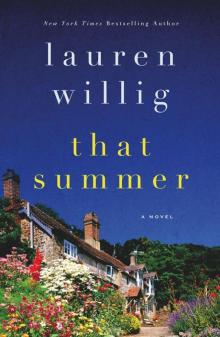 That Summer: A Novel
That Summer: A Novel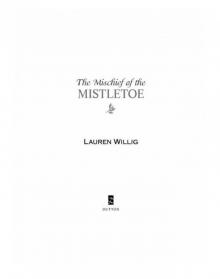 The Mischief of the Mistletoe: A Pink Carnation Christmas
The Mischief of the Mistletoe: A Pink Carnation Christmas